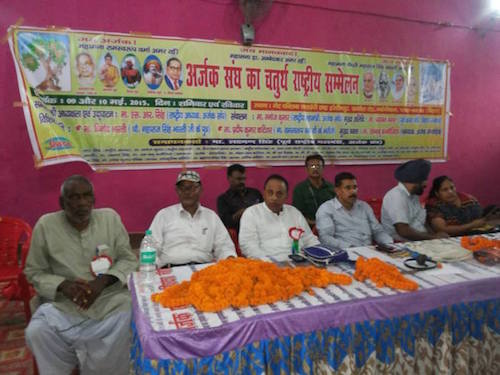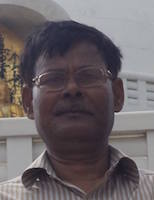A seminar on the “Role of media, literature and education” was held during the social convention of Arjak Sangh in Patna from 9-10 May. I have witnessed many a socio-religious convention but it was for the first time that I saw such a big event centred on the mission of OBCs and Backwards. Stalls selling newspapers and magazines are put up in almost all conventions but the amount of Bahujan literature and the number of magazines available in the Arjak Sangh convention was stupendous. The sale was so brisk that one felt sorry for those who assert that reading habits are on the decline.
 When the session began, the hall was jam-packed. All were farmers, workers and ordinary people but all of them were aware, alert and curious. On the dais were scholars, journalists, social workers, teachers, employees and Arjak Sangh’s office-bearers. The speakers expressed concern over the existence of two kinds of education, two kinds of literature and two kinds of media in the country. They held a discussion on what their role should be in the re-building of the nation. The speakers said that the Bahujans were kept away from the English language. They were told that it was a foreign language and difficult to understand. This was done despite the fact that texts on modern knowledge, science and technology are available only in English. That is why Babasaheb Ambedkar insisted on learning both English and Sanskrit: English, to move forward in the modern age of science, and Sanskrit, to read and understand ancient texts so as to break free from the superstitions, myths and useless things in them. Like all the scripts in the world, the Indian scripts have also been developed by the Bahujans – Devanagari script is based on Brahmi and the oldest version of Brahmi script was used in Ashokan edicts. So, we should be proud of the Devanagari script and the languages it is used for but we should use them from the Bahujan perspective.
When the session began, the hall was jam-packed. All were farmers, workers and ordinary people but all of them were aware, alert and curious. On the dais were scholars, journalists, social workers, teachers, employees and Arjak Sangh’s office-bearers. The speakers expressed concern over the existence of two kinds of education, two kinds of literature and two kinds of media in the country. They held a discussion on what their role should be in the re-building of the nation. The speakers said that the Bahujans were kept away from the English language. They were told that it was a foreign language and difficult to understand. This was done despite the fact that texts on modern knowledge, science and technology are available only in English. That is why Babasaheb Ambedkar insisted on learning both English and Sanskrit: English, to move forward in the modern age of science, and Sanskrit, to read and understand ancient texts so as to break free from the superstitions, myths and useless things in them. Like all the scripts in the world, the Indian scripts have also been developed by the Bahujans – Devanagari script is based on Brahmi and the oldest version of Brahmi script was used in Ashokan edicts. So, we should be proud of the Devanagari script and the languages it is used for but we should use them from the Bahujan perspective.
BAMCEF’s Udyanchandra Rai and this writer, in their speeches, besides laying emphasis on English education, also talked about the media. “It is a matter of great satisfaction for the Bahujan community that in the form of FORWARD Press, we have been able to develop an alternative print media of our own. It is published both in Hindi and English – a Hindi article in one column of the page and its English translation next to it. This bilingual monthly has made waves over the last two-three years. It has brought about a revolution in the Bahujan community and has also influenced the rival ideologies. The latest issue of the magazine is available in the stalls put up here.”
The speakers said that if the caste structure isn’t dismantled – the possibility of which is very remote – then the Bahujans should hunt for their identity and legacy in every corner of this country. The Dalits have discovered their history and legacy. The Bahujans have the biggest legacy, which is yet to be identified. That is why the brahmanical forces are using OBCs more than Dalits as their pawns. They fear that they may get exposed. The OBCs need to march forward. Instead of abusing Brahmanism they should try to identify the Brahmanism lurking within them and purge themselves of it.
Citing the example of Punjab and Kerala, Balvinder Singh, general secretary of Federation of Indian Rationalist Associations (FIRA), said that in these two states, a social, educational, economic and cultural revolution had taken place in the Bahujan community.
Former judge Aadhyasharan Chaudhary demanded that education should be removed from the concurrent list and added to the Union list. High Court advocate and chairperson of Ambedkar mission, Dr Mala Das, expressed concern over the poor representation of and the discrimination against Bahujans in the judiciary. Journalist Sanjay Shyam explained in detail how the media does not take notice of the Bahujans and emphasized the need for developing an alternative media. Chandrashekhar Kumar of Bharat Shoshit Samaj said that organizations which share a common ideology should forge a joint front for launching movements and agitations. Ramchandra Katiyar, who was close to Ramswaroop Verma, the founder of the Arjak Sangh, threw light on the objectives of the sangh.
S.R. Singh, national president of Arjak Sangh, who chaired the seminar, spoke at length about the mission and vision of the Sangh, which was founded by Verma in 1968. Other speakers included lawyer Ravi Bhushan, Prof Alakhdev Prasad Anchal, Sanjay Maurya and Ramavati Arjak. Under the banner of Srijan, Rohtas, a cultural organization of the backwards, Harishchandra Yadav, Harivansh Azad, Brijmohan and other artistes from UP and Bihar presented motivational songs and filled the audience with enthusiasm and fervour. Dr Manoj Kumar, Arjak Sangh’s national general secretary, was the host and coordinator at the two-day convention.
Published in the June 2015 issue of the FORWARD Press magazine





